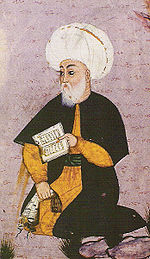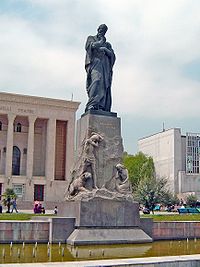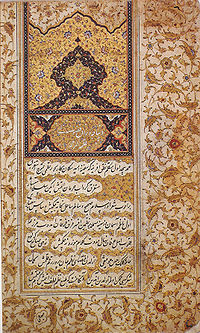Fuzûlî
- For the administrative region of Azerbaijan, see Fizuli Rayon; for the city in Azerbaijan, see Füzuli.
| Muhammad bin Suleyman | |
|---|---|
 Artistic rendition of Fuzûlî |
|
| Born | 1483 (approximate) Karbala, Akkoyunlu, now Iraq |
| Died | 1556 Karbala, Ottoman Empire, now Iraq |
| Period | 16th century |
| Genres | Romantic Azerbaijani epic poetry, wisdom literature |
| Notable work(s) | The Epic of Layla and Majnun (Dâstân-ı Leylî vü Mecnûn) |
Fużūlī (or Fuduli, فضولی; Azerbaijani: Füzuli, c. 1483 – 1556) was the pen name of the Azerbaijani[1][2][3] and Ottoman poet, writer and thinker Muhammad bin Suleyman (محمد بن سليمان). Often considered one of the greatest contributors to the Dîvân tradition of Azerbaijani literature,[4] Fuzûlî in fact wrote his collected poems (dîvân) in three different languages: Azerbaijani Turkic, Persian, and Arabic. Although his Turkish works are written in Azerbaijani, he was well-versed in both the Ottoman and the Chagatai Turkic literary traditions as well. He was also well versed in mathematics and astronomy[5].
Contents |
Life
| Turkish literature |
|---|
| By category |
| Epic tradition |
|
Orhon |
| Folk tradition |
|
Folk literature |
| Ottoman era |
|
Poetry · Prose |
| Republican era |
|
Poetry · Prose |
Fuzûlî is generally believed to have been born around 1483 in what is now Iraq, when the area was under Ak Koyunlu Turkmen rule; he was probably born in either Karbalā’ or an-Najaf.[5] He is believed to belong to Bayat tribe, one of the Turkic Oghuz tribes who were related to the Ottoman Kayı clan and were scattered throughout the Middle East, Anatolia, and the Caucasus at the time. Though Fuzûlî's ancestors had been of nomadic origin, the family had long since settled in towns.
Fuzûlî appears to have received a good education, first under his father—who was a mufti in the city of Al Hillah—and then under a teacher named Rahmetullah.[6] It was during this time that he learned the Persian and Arabic languages in addition to his native Azerbaijani. Fuzûlî showed poetic promise early in life, composing sometime around his twentieth year the important masnavi entitled Beng ü Bâde (بنگ و باده; "Hashish and Wine"), in which he compared the Ottoman Sultan Bayezid II to hashish and the Safavid shah Ismail I to wine, much to the advantage of the latter.
One of the few things that is known of Fuzûlî's life during this time is how he arrived at his pen name. In the introduction to his collected Persian poems, he says: "In the early days when I was just beginning to write poetry, every few days I would set my heart on a particular pen name and then after a time change it for another because someone showed up who shared the same name".[7] Eventually, he decided upon the Arabic word fuzûlî—which literally means "impertinent, improper, unnecessary"—because he "knew that this title would not be acceptable to anyone else".[8] Despite the name's pejorative meaning, however, it contains a double meaning—what is called tevriyye (توريه) in Ottoman Divan poetry—as Fuzûlî himself explains: "I was possessed of all the arts and sciences and found a pen name that also implies this sense since in the dictionary fuzûl (ﻓﻀﻮل) is given as a plural of fazl (ﻓﻀﻞ; 'learning') and has the same rhythm as ‘ulûm (ﻋﻠﻮم; 'sciences') and fünûn (ﻓﻨﻮن; 'arts')".[9]
In 1534, the Ottoman sultan Süleymân I conquered the region of Baghdad, where Fuzûlî lived, from the Safavid Empire. Fuzûlî now had the chance to become a court poet under the Ottoman patronage system, and he composed a number of kasîdes, or panegyric poems, in praise of the sultan and members of his retinue, and as a result, he was granted a stipend. However, owing to the complexities of the Ottoman bureaucracy, this stipend never materialized. In one of his best-known works, the letter Şikâyetnâme (شکايت نامه; "Complaint"), Fuzûlî spoke out against such bureaucracy and its attendant corruption:
- سلام وردم رشوت دگلدر ديو آلمادىلر
- Selâm verdim rüşvet değildir deyü almadılar.[10]
- I said hello, but they didn't accept as it wasn't a bribe.
Though his poetry flourished during his time among the Ottomans, the loss of his stipend meant that, materially speaking, Fuzûlî never became secure. In fact, most of his life was spent attending upon the Shi`ite Tomb of `Alî in the city of an-Najaf, south of Baghdad.[11] He died during a plague outbreak in 1556, in Karbalā’, either of the plague itself or of cholera.
Works

Fuzûlî has always been known, first and foremost, as a poet of love. It was, in fact, a characterization that he seems to have agreed with:
- مندن فضولی ايستمه اشعار مدح و ذم
- من عاشقام هميشه سوزم عاشقانه در
- Menden Fuzûlî isteme eş'âr-ı medh ü zem
- Men âşıkam hemîşe sözüm âşıkânedür[12]
- Don't ask Fuzûlî for poems of praise or rebuke
- I am a lover and speak only of love
Fuzûlî's notion of love, however, has more in common with the Sufi idea of love as a projection of the essence of God—though Fuzûlî himself seems to have belonged to no particular Sufi order—than it does with the Western idea of romantic love. This can be seen in the following lines from another poem:
- عاشق ايمش هر ن وار ﻋﺎﻝﻢ
- ﻋلم بر قيل و قال ايمش آنجق
- ‘Âşık imiş her ne var ‘âlem
- ‘İlm bir kîl ü kâl imiş ancak[13]
- All that is in the world is love
- And knowledge is nothing but gossip
The first of these lines, especially, relates to the idea of wahdat al-wujūd (وحدة الوجود), or "unity of being", which was first formulated by Ibn al-‘Arabī and which states that nothing apart from various manifestations of God exists. Here, Fuzûlî uses the word "love" (عاشق ‘aşk) rather than God in the formula, but the effect is the same.
In Fuzûlî's œuvre, his most extended treatment of this idea of love is in the long poem Dâstân-ı Leylî vü Mecnun (داستان ليلى و مجنون), a mesnevî which takes as its subject the classical Middle Eastern love story of Layla and Majnun. In his version of the story, Fuzûlî concentrates upon the pain of the mad lover Majnun's separation from his beloved Layla, and comes to see this pain as being of the essence of love:
- یا رب بلا عاشق ايله قيل آشنا منى
- بر دم بلا عاشقدن ايتمه جدا منى
- آز ايلمه عنایتونى اهل دردن
- يعنى كه چوح بلالره قيل مبتلا منى
- Yâ Rab belâ-yı ‘aşk ile kıl âşinâ meni
- Bir dem belâ-yı ‘aşkdan etme cüdâ meni
- Az eyleme ‘inâyetüni ehl-i derdden
- Ya‘ni ki çoh belâlara kıl mübtelâ meni[14]
- Oh God, let me know the pain of love
- Do not for even a moment separate me from it
- Do not lessen your aid to the afflicted
- But rather, make lovesick me one among them
The ultimate value of the suffering of love, in Fuzûlî's work, lies in that it helps one to approach closer to "the Real" (al-Haqq الحق), which is one of the 99 names of God in Islamic tradition.
Selected bibliography

Works in Azeri Turkish
- Dîvân ("Collected Poems")
- Beng ü Bâde (بنگ و باده; "Hashish and Wine")
- Hadîkat üs-Süedâ (حديقت السعداء; "Garden of Pleasures")
- Dâstân-ı Leylî vü Mecnûn (داستان ليلى و مجنون; "The Epic of Layla and Majnun")
- Risâle-i Muammeyât (رسال ﻤﻌﻤيات; "Treatise on Riddles")
- Şikâyetnâme (شکايت نامه; "Complaint")
Works in Persian
- Dîvân ("Collected Poems")
- Anîs ol-qalb (انیس القلب; "Friend of the Heart")
- Haft Jâm (هفت جام; "Seven Goblets")
- Rend va Zâhed (رند و زاهد; "Hedonist and Ascetic")
- Resâle-e Muammeyât (رسال ﻤﻌﻤيات; "Treatise on Riddles")
- Sehhat o Ma'ruz (صحت و معروض; "Health and Sickness")
Works in Arabic
- Dîvân ("Collected Poems")
- Matla' ul-İ'tiqâd (مطلع الاﻋﺘﻘﺎد; "The Birth of Faith")
Legacy
According to the Encyclopædia Iranica:
| “ | Fuzuli is credited with some fifteen works in Arabic, Persian, and Azerbaijani, both in verse and prose. Although his greatest significance is undoubtedly as a Turkish poet, he is also of importance to Persian literature thanks to his original works in that language (indeed, Persian was the language he preferred for his Shi'ite religious poetry); his Turkic adaptations or translations of Persian works; and the inspiration he derived from Persian models for his Turkic works.
... The fundamental gesture of Fozuli's poetry is inclusiveness. It links Azeri, Turkmen and Ottoman (Rumi) poetry, east and west; it also bridges the religious divide between Shiism and Sunnism. Generations of Ottoman poets admired and wrote responses to his poetry; no contemporary canon can bypass him. |
” |
Honours
In 1959, the a town and the associated rayon in Azerbaijan were renamed after him.[15]
In 1996 the National Bank of Azerbaijan minted a golden 100 manat and a silver 50 manat commemorative coins dedicated to the 500th anniversary of Fuzûlî's life and activities.[16]
References
Primary
- Fuzulî. Fuzulî Divanı: Gazel, Musammat, Mukatta' ve Ruba'î kısmı. Ed. Ali Nihad Tarlan. İstanbul: Üçler Basımevi, 1950.
- Fuzulî. Leylâ ve Mecnun. Ed. Muhammet Nur Doğan. ISBN 975-08-0198-9.
Secondary
- Andrews, Walter G. "Fuzûlî" in Ottoman Lyric Poetry: An Anthology. pp. 235–237. ISBN 0-292-70472-0.
- "Fozuli, Mohammad b. Solayman". Encyclopædia Iranica. Retrieved 25 August 2006.
- "Fuzuli, Mehmed bin Süleyman." Encyclopædia Britannica. 2006. Encyclopædia Britannica Premium Service. 23 Aug. 2006 <http://www.britannica.com/eb/article-9035730>.
- Kudret, Cevdet. Fuzuli. ISBN 9751020166.
- Şentürk, Ahmet Atillâ. "Fuzûlî" in Osmanlı Şiiri Antolojisi. pp. 280–324. ISBN 975-08-0163-6.
Notes
- ↑ Encyclopædia Iranica. G. Doerfer. Azeri Turkish
- ↑ Encyclopædia Iranica. H. Javadi and K. Burill. Azeri Literature
- ↑ A. M. A Shushtery. Outlines of Islamic Culture - Volume I: Historical and Cultural Aspects. READ BOOKS, 2007. ISBN 1406741132, 9781406741131, p. 130
- ↑ "Fuzuli, Mehmed bin Süleyman" in Encyclopædia Britannica
- ↑ 5.0 5.1 "Fozuli, Mohammad b. Solayman" in Encyclopaedia Iranica
- ↑ Şentürk 281
- ↑ Quoted in Andrews, 236.
- ↑ Ibid.
- ↑ Ibid.
- ↑ Kudret 189
- ↑ Andrews 237
- ↑ Tarlan 47
- ↑ Kudret 20
- ↑ Leylâ ve Mecnun 216
- ↑ Great Soviet Encyclopedia. Fizuli (town in Azerbaijan SSR).
- ↑ Central Bank of Azerbaijan. Commemorative coins. Coins produced within 1992-2010: Gold and silver coins dedicated to memory of Mahammad Fuzuli. – Retrieved on 25 February 2010.
External links
- Muhammed Fuzuli—a website with a brief biography and translated selections from Leyla and Mecnun
- FUZULİ
- Fuzûlî in Stanford J. Shaw's History of the Ottoman Empire and Modern Turkey
|
||||||||||||||
|
|||||||||||
|
|||||||||||||||||||||||||||||||||||||||||||||||||||||||||||||||